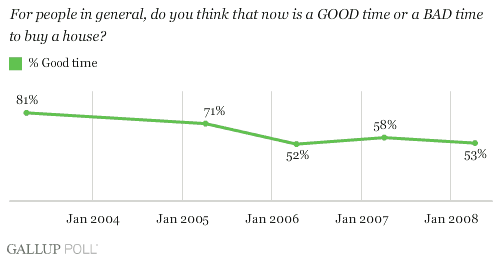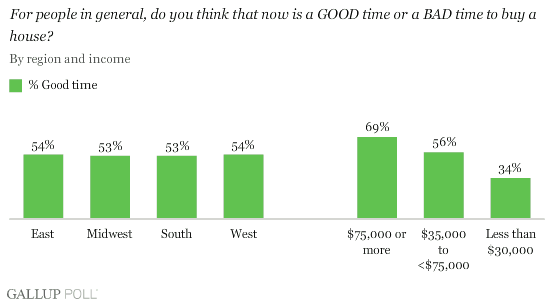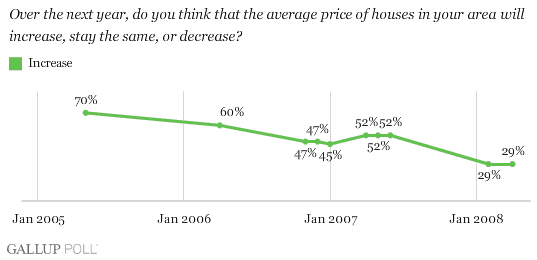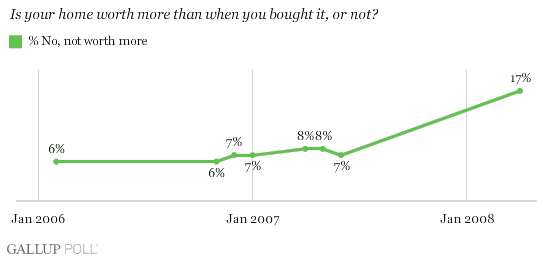PRINCETON, NJ -- The percentage of Americans saying now is a good time for people in general to buy a house fell by only five percentage points over the past year, to 53% in April 2008 from 58% in April 2007, but is down significantly from 81% in 2003 and 71% in 2005.

Upper-Income Americans See Good Time to Buy
Given all the doom and gloom in today's housing market, it may seem surprising that 53% of Americans say now is a good time to buy a house. Still, it is hard to argue with the idea that it is now a "buyer's market" in most of the nation's residential real estate markets for consumers who can get the financing they need to close a deal -- although this is way down from the housing boom days of 2003 and 2005, when 81% and 71% of Americans, respectively, thought it was a good time to buy. So on an overall basis, most Americans still back a home purchase, but on a relative basis, they do not think it is as good a bet as it was three to five years ago.
While there are essentially no differences in how consumers view the opportunity to buy a house by region, there are differences by income. Only 34% of those making less than $30,000 a year see this as a good time to buy a house, compared with 56% of those making $30,000 but less than $75,000, and 69% of those making $75,000 or more. In part, this may be because lower-income households that once had access to housing financing using subprime loans are finding home loans harder to get.

Far Fewer Expect Housing Prices to Increase
Housing price expectations have changed dramatically over the past few years. About three years ago, 7 in 10 Americans expected housing prices in their local areas to increase over the year ahead and only 1 in 20 thought they would decrease. In April 2006, 6 in 10 continued to expect house prices would increase, and, as recently as June 2007, about half felt this way. However, in the most recent poll, conducted April 6-9, only 3 in 10 expect their local housing prices to increase and about 4 in 10 expect prices to fall during the year ahead.

Twice as Many Say House Is Worth Less Than When They Bought It
Even with all the housing turmoil of recent years, around 9 in 10 homeowners maintained in 2006 and 2007 polling that their homes were worth more than when they bought them, and only 6% to 8% said this wasn't the case. This has changed in 2008, with 17% of homeowners -- twice as many as in 2007 -- saying their homes are not worth more now than when they bought them. Still, the vast majority of homeowners believe their houses have gained value since they purchased them.

Housing as an Election-Year Issue
The Senate has passed housing legislation providing $24 billion focused largely on tax breaks for home builders. In sharp contrast, the House Ways and Means Committee approved temporary $7,500 tax credits to first-time home buyers that they would have to repay over a period of time. At the same time, all of the presidential candidates have proposed new efforts to help the housing market, although the program suggested by Republican John McCain is much more limited in scope than those proposed by his Democratic rivals Barack Obama and Hillary Clinton.
Of course, conditions in the housing market during the months ahead are important not only to buyers, sellers, lenders, and investors, but also to every homeowner. As a result, how the housing market reaches bottom, how the gains and losses are distributed, and how the recovery begins are likely to be major election-year issues.
Gallup's data suggest that many Americans recognize it is a good time to buy a house when there are relatively few buyers and lots of sellers. Although it sometimes seems heartless, free markets do provide opportunities for some, even as others experience the pain of financial loss. Most consumers also recognize that the home is the average American's basic source of wealth and will continue to be so once the current residential real estate debacle runs its course. Policymakers should keep in mind this essential willingness of Americans to continue investing in housing. It suggests that the solution to the current situation lies more in rebuilding the housing finance system than in propping up housing prices.
Survey Methods
Results are based on telephone interviews with 1,021 national adults, aged 18 and older, conducted April 6-9, 2008. For results based on the total sample of national adults, one can say with 95% confidence that the maximum margin of sampling error is ±3 percentage points.
For results based on the sample of 783 homeowners, the maximum margin of sampling error is ±4 percentage points.
Interviews are conducted with respondents on land-line telephones (for respondents with a land-line telephone) and cellular phones (for respondents who are cell-phone only).
In addition to sampling error, question wording and practical difficulties in conducting surveys can introduce error or bias into the findings of public opinion polls.
To provide feedback or suggestions about how to improve Gallup.com, please e-mail feedback@gallup.com.
